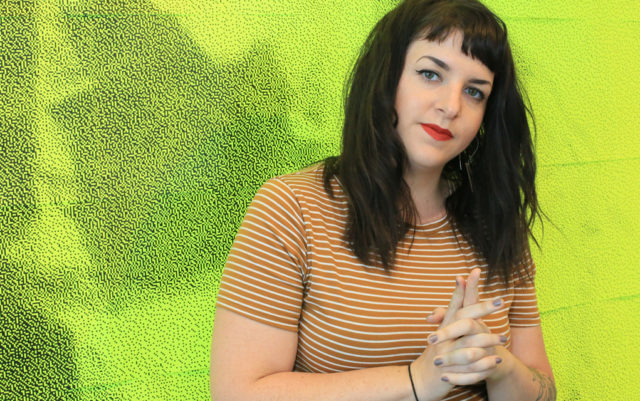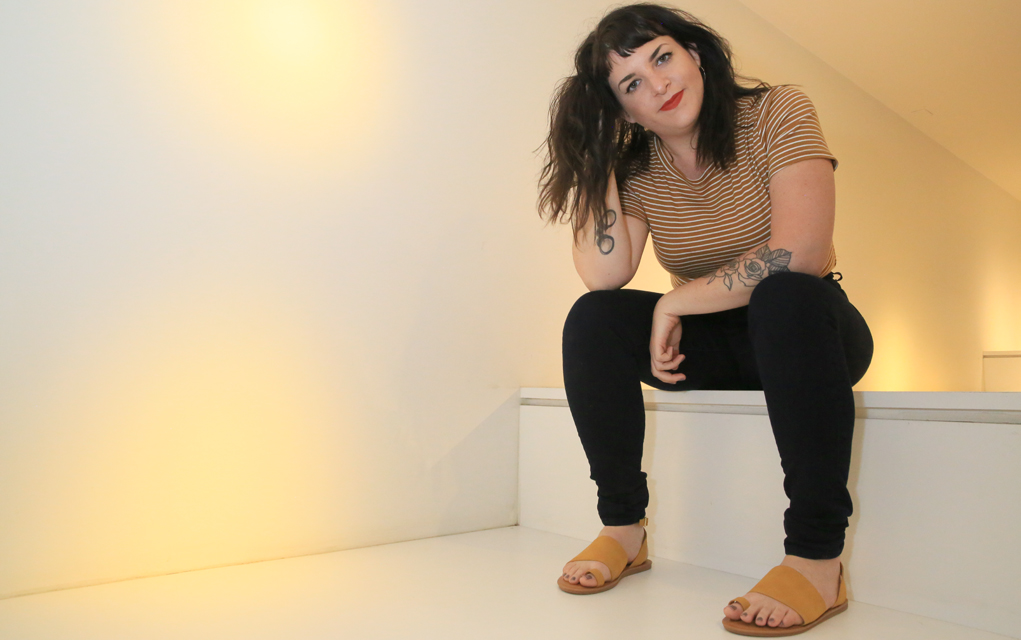
On her way to the Pekoe Sip House on 30th Street, Megan Falley steps across a message painted on the sidewalk. She pauses, reversing her stride for a better view. “If your dreams don’t scare you,” it reads, “dream bigger.”
OK, she nods and moves along. She’s used to random messages from the Universe by now, being a self-made spoken-word poet and book author.
Inside the tea house, she orders iced tea, no sugar. It’s her first day without a sip of coffee in as long as she can remember. Normally she’s a five-cup-a-day kind of gal, but she’s curious: Will eliminating caffeine change her for better, or for worse? These sorts of mind-body connections are something she’s made a habit of investigating.
Falley, a life-long performer, presents herself with ease, happy to share when I ask questions — her eyes are always searching, though, as if she’s scanning something only she can see, searching for just the right word. When she sips from the glass, sitting outside on the patio, her strawberry-red lipstick doesn’t transfer.
“There’s a different ease to the pace here,” she says, gesturing to Boulder with a wide sweep. It’s nearly been two years since Falley left Brooklyn and bee-lined it to Colorado in her maroon Nissan Altima. “I’m actually not a very fast person,” she says. “So, I don’t think very fast. I guess I write fast, but that’s about it.”
The 2,000-mile move across the country was supposed to take four days, she explains. But she did it in two. It was love, after all, that brought her here like a magnet. Falley knew where she wanted to be: with her partner, Andrea, who is also a spoken-word poet. “In a way, I feel I’ve laid down more roots in the two years I’ve lived here than anywhere else. … The most simple things are gorgeous.”
Which is saying something, considering she’s called New York home her entire life and makes a living by translating into words how her surroundings make her feel.
Falley, who will be hosting a spoken-word performance at the Boulder Center for Conscious Community (BC3) May 10, figures she’s best known for her poem “Fat Girl.” In a YouTube video of her performance at the 2014 National Poetry Slam semifinals, she ratchets up the power of her voice with each line: “Fat girl don’t touch her stomach. Fat girl turn the lights off. Fat girl keep her T-shirt on. Fat girl not pregnant, fat girl food baby.” Her hands run down her stomach with dramatic pause.
“Fat girl love her skinny mirror,” her hand waterfalls down the air. “Fat girl bad bulimic, fat girl binge and no purge,” she throws her arms open, shaking her head, “Fat girl can’t even throw up right.”
As she enunciates the “t,” her eyes light on fire. She moves on stage like it’s her living room, like the audience is comprised of thousands of younger sisters in need of conviction. They clap, cheer, roar in response. Falley continues, “Fat girl’s friends come over to stare at her brother’s chiseled abdominals and ignore fat girl don’t hate her body. Fat girl hate the world.”
She closes the performance: “Fat girl thick skin, fat girl dance anyway. Fat girl shirt off, fat girl lights on,” and she repeats, throwing her hands up, “Fat girl, lights on.”
Falley is electric. Unapologetic. Scrolling through dozens of videos of her live performances captured online, it’s clear her spoken-word poetry is heart-pounding advice for anyone looking to live an unabashed, unashamed, unrepentant life. “I want people to undo their shame,” she says. And that’s why she writes.

To be clear, the full effect of Falley’s message translates best when seen live or at least heard, not read. “I work really hard for things to be beautiful to read and be a great experience as a book,” she says, noting her fourth book, Drive Here and Devastate Me, will be published in September. “But I think it’s an art form that really comes alive out loud.”
Slam poetry is the perfect blend of writing and performance, Falley believes — her two favorite modes of creativity. But she didn’t know it even existed until she saw her school’s slam team perform during her freshman year of college. “I saw them and thought, ‘Oh, I get it! That’s for me!’ That was 2006, and I have not really stopped since then.”
Falley has turned her personal experiences into public prose, exposing her queerness and the raw chasm between self-confidence and self-doubt. She’s dissected moments in her own life that’ve helped her and her listeners comprehend a woman’s existence on Earth.
“I feel like I got my education in the field in New York, going to open mics and slams a couple times a week,” Falley says. Now she teaches poetry, too, in workshops around Boulder and with students online, some based in other countries like Australia and South Africa.
Her event at the BC3 will showcase student work from her most recent workshop, “Poems That Don’t Suck.” “My hosting is very involved,” she says. “I’ll read probably three or four poems, and I’ll tell lots of stories. … It’s very queer. Very healing. Very beautiful.”
When Falley sits down to write, she says, “I want my poems to be written and done in an hour. … I like immediate gratification with writing.” And when that happens, “Those are the moments I really cherish, where I’m like a vessel for something,” she says. “But probably the moments I learn more are when that’s not happening and I really have to fight to figure out what I’m trying to say.”
When Falley prepares for a show, she records herself reciting the poems. Then she listens to them again and again, memorizing the words. “Then I just try to let it come through with the emotions, and see what happens.”
At another National Poetry Slam event, Falley took the stage with fellow poet Olivia Gatwood. The duo performed “Say No,” a tribute to the woman who “argues for a higher salary and her co-workers call her a bitch in the break room”; to the woman who “is told to get naked at a frat party. She refuses, a boy with a kind smile puts his arm around her, offers her a beer, filled with the magic that erases No from her vocabulary”; and to the woman who “is told that if she doesn’t want to hear the song about rape, don’t listen to it, but it follows her in the supermarket, the gym, the girl’s clothing aisle, and now she knows all the words.”
Again the crowd roars in response to each line, like waves of #metoo slapping the concert hall walls. “That’s where my real passion is,” Falley says, “to be witness to the sharing of it and the reaction and have it be more of a conversation rather than, I put this out [in book form] and don’t see somebody experience it. I love the conversation element of it.”
She tends to have conversations with herself, too, in her poetry. To keep herself honest, she revisits her own work, sometimes changing it, sometimes removing it from the public, sometimes responding to it herself. In her second poetry book, Red Head and the Slaughter King, she includes a retraction at the end of each chapter. “It’s another piece that explores another angle,” she says. “That sort of thing has always been important to me.”
A few years after “Fat Girl” debuted, Falley wrote a follow-up poem after she’d learned more about body privilege and weathered critiques that she “wasn’t fat enough” to recite it. “I realized I had written ‘Fat Girl’ and was also navigating the world with a lot of thin privilege at the same time. So I wrote a poem called ‘On Being One of the Skinny Girls at Fat Camp’ as sort of an addendum to the poem before.”
In the second poem she recites, “I finally wrote about being the fat girl I was called my whole life, and a fat activist said I wasn’t fat enough to speak, said I just wanted attention, but I already get attention. The men on the street whistle. When I don’t respond, snort like pigs.”
She continues, “I know that every size of woman has been thrashed in the jaws of some ugly machine, I know the cruelty I have spoke onto others was first practiced on the mirror, was taught to me by a lineage of men, I know that in the after picture I understand my privilege and my pain.”
When she starts writing a poem, Falley insists there’s never a big agenda. “I think I just write about what matters to me or what’s really important to me at that time. It’s not that big of a decision process.”
For as long as she lives, she hopes to keep creating. So, when prompted to share her future dreams, she says without pause, “I’m going to try and say something scary.
“Continually making art and being more focused on the creation process and the outcome. My definition of ‘making it’ has changed [since I started performing poetry.] I create because I love to create. I create every day even when it’s hard. It’s just a more holistic approach, less determined by who likes your shit on social media. I think there’s more soul work that’s about to happen.”














